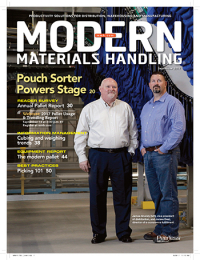Real-time battery monitoring fills in the data gaps
As batteries are shuffled around a fleet, any hope of tracking them—or their abusers—is lost. Or, is it?
From their impact on productivity to their cost, poorly managed batteries can reduce the efficiency of a forklift fleet. The challenge is especially difficult in large multi-shift fleets, where state of charge, equalization and abuse require lots of effort to monitor. According to Jim Gaskell, director of global technology and business development at Crown Equipment, battery management solutions have improved, but the marketplace could benefit from diagnostic devices for lead-acid batteries.
“An industrial battery is rated at 2,000 cycles, from full charge to discharge, but they rarely last that long.” says Gaskell. “The only time I ever believe a customer who says they have their batteries under control is when they are getting four or five years out of them and don’t have to replace cells. But if batteries only last one or two years, they have problems. If I had to guess, maybe 80% of folks don’t have control of their batteries.”
Gaskell says two pieces are key. The first is maintaining the battery when it’s charging, which a number of smart charger and battery monitoring solutions do very well. The second piece is assessing the health of the battery during use, which is a less common practice.
“It’s important to have a perspective of both sides of that equation,” Gaskell says. “A lot of charger systems are automated to protect the battery when it’s charging, but there’s not a lot to protect it from operators.”
Abuse can cause amperage spikes and raise battery temperatures, but you can’t necessarily blame the operator for the way forklifts have traditionally communicated. A blinking light tells the operator water is low, but the probe is only attached to the one cell that endures the most heat.
“The idea is that when that one cell is low, the others need to be checked,” Gaskell says. “But that blinking light is not useful. A drop of water on that probe will tell you there’s water when it’s actually empty. It’s a tool that is notoriously wrong.”
Instead, wireless battery health monitors can keep track of the battery in real time, taking multiple readings to verify the true water level. If operators tend to run their equipment hard, the devices will report amperage spikes and log when and where they happened.
“These health monitors are not inexpensive, but if you have 10 operators damaging batteries and equipment, they will eventually damage all batteries if they’re rotated,” Gaskell says.
All the data for all batteries is collected at a central portal that gives managers actionable data about the activity of the batteries while they are being used.“For a fleet of 100 trucks, each with two batteries, you can see the age and health of every battery and proactively budget for their replacement,” Gaskell says. “Without this kind of device, you need someone in the battery room maintaining them as a full-time job. You’d need to physically analyze each battery or wait until the charger tells you there’s a problem.”

Article Topics
Columns News & Resources
New resource center for weighing and dimensioning Protective packaging roundup MODEX C-Suite Q&A: Troy Donnelly, Senior VP of Sales, Marketing, and Application, DMW&H When Just-in-Time Just Doesn’t Work Recycling coastline plastic into premium reusable packaging Fresh food, anyone? RPCs protect in the supply chain Why Isn’t Your Loading Dock Connected to Your Supply Chain? More ColumnsLatest in Materials Handling
Materials Handling Robotics: The new world of heterogeneous robotic integration Lucas Watson appointed CSO for Körber’s Parcel Logistics business in North America Hyster recognizes Dealers of Distinction for 2023 Carolina Handling names Joe Perkins as COO C-suite Interview with Keith Moore, CEO, AutoScheduler.AI: MODEX was a meeting place for innovation Walmart deploying autonomous lift trucks at four of its high-tech DCs Coles shops big for automation More Materials HandlingAbout the Author
Subscribe to Materials Handling Magazine

Find out what the world's most innovative companies are doing to improve productivity in their plants and distribution centers.
Start your FREE subscription today.
April 2024 Modern Materials Handling

Latest Resources












